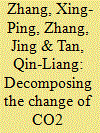| Srl | Item |
| 1 |
ID:
122742


|
|
|
|
|
| Publication |
2013.
|
| Summary/Abstract |
This paper presents an alternative decomposition method to explore the driving forces of change in carbon emissions by using distance functions estimated by data envelopment analysis. The proposed approach can isolate the effects of changes in GDP composition and energy supply composition on the change of carbon emissions. In addition, it is capable of identifying the effects of changes in different input ratios, which may be very important if there are substitution effects among different inputs. Moreover, the proposed model can measure the effects of changes in good and bad output technical efficiencies. Consequently, this decomposition technique allows a change of carbon emissions to be decomposed into contributions from ten factors, which provides more insights for policy makers. We apply this model to decompose carbon emissions in 25 OECD counties and China. For the sample countries as a whole, the empirical results indicate that the economic growth is the crucial driver to carbon emissions increase, while the changes in GDP composition and capital-energy ratio are two main drivers to carbon emissions reduction. In particular, we discuss in detail the driving forces of China's carbon emissions change in order to propose some valuable policy implications for China from an international perspective.
|
|
|
|
|
|
|
|
|
|
|
|
|
|
|
|
| 2 |
ID:
103608


|
|
|
|
|
| Publication |
2011.
|
| Summary/Abstract |
This paper uses a total-factor framework to investigate energy efficiency in 23 developing countries during the period of 1980-2005. We explore the total-factor energy efficiency and change trends by applying data envelopment analysis (DEA) window, which is capable of measuring efficiency in cross-sectional and time-varying data. The empirical results indicate that Botswana, Mexico and Panama perform the best in terms of energy efficiency, whereas Kenya, Sri Lanka, Syria and the Philippines perform the worst during the entire research period. Seven countries show little change in energy efficiency over time. Eleven countries experienced continuous decreases in energy efficiency. Among five countries witnessing continuous increase in total-factor energy efficiency, China experienced the most rapid rise. Practice in China indicates that effective energy policies play a crucial role in improving energy efficiency. Tobit regression analysis indicates that a U-shaped relationship exists between total-factor energy efficiency and income per capita.
|
|
|
|
|
|
|
|
|
|
|
|
|
|
|
|